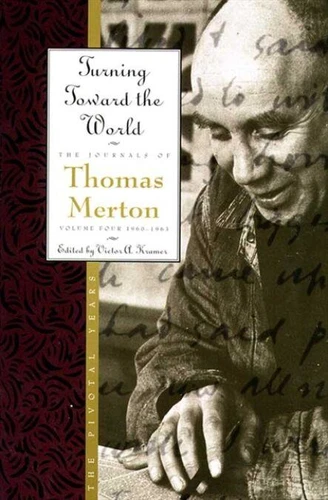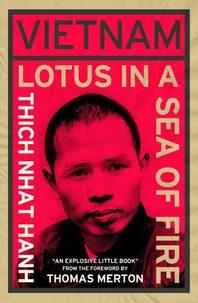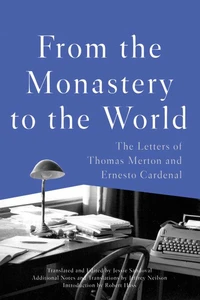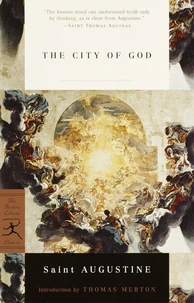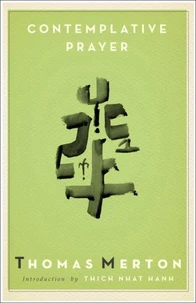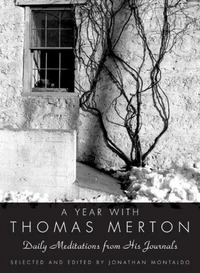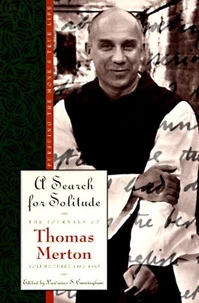Turning Toward the World. The Pivotal Years; The Journals of Thomas Merton, Volume 4: 1960 - 1963
Par :Formats :
Disponible dans votre compte client Decitre ou Furet du Nord dès validation de votre commande. Le format ePub protégé est :
- Compatible avec une lecture sur My Vivlio (smartphone, tablette, ordinateur)
- Compatible avec une lecture sur liseuses Vivlio
- Pour les liseuses autres que Vivlio, vous devez utiliser le logiciel Adobe Digital Edition. Non compatible avec la lecture sur les liseuses Kindle, Remarkable et Sony
- Non compatible avec un achat hors France métropolitaine
 , qui est-ce ?
, qui est-ce ?Notre partenaire de plateforme de lecture numérique où vous retrouverez l'ensemble de vos ebooks gratuitement
Pour en savoir plus sur nos ebooks, consultez notre aide en ligne ici
- FormatePub
- ISBN978-0-06-175489-0
- EAN9780061754890
- Date de parution13/10/2009
- Protection num.Adobe DRM
- Infos supplémentairesepub
- ÉditeurHarperOne
Résumé
"Inexorably life moves on towards crisis and mystery. Everyone must struggle to adjust himself to this, to face the situation for 'now is the judgment of the world.' In a way, each one judges himself merely by what he does. Does, not says. Yet let us not completely dismiss words. They do have meaning. They are related to action. They spring from action and they prepare for it, they clarify it, they direct it." --Thomas Merton, August 16, 1961The fourth volume of Thomas Merton's complete journals, one of his final literary legacies, springs from three hundred handwritten pages that capture - in candid, lively, deeply revealing passages - the growing unrest of the 1960s, which Merton witnessed within himself as plainly as in the changing culture around him.
In these decisive years, 1960-1963, Merton, now in his late forties and frequently working in a new hermitage at the Abbey of Gethsemani, finds himself struggling between his longing for a private, spiritual life and the irresistible pull of social concerns. Precisely when he longs for more solitude, and convinces himself he could not cut back on his writing, Merton begins asking complex questions about the contemporary culture ("the 'world' with its funny pants, of which I do not know the name, its sandals and sunglasses"), war, and the churches role in society.
Thus despite his resistance, he is drawn into the world where his celebrity and growing concerns for social issues fuel his writings on civil rights, nonviolence, and pacifism and lead him into conflict with those who urge him to leave the moral issues to bishops and theologians. This pivotal volume in the Merton journals reveals a man at the height of a brilliant writing career, marking the fourteenth anniversary of his priesthood but yearning still for the key to true happiness and grace.
Here, in his most private diaries, Merton is as intellectually curious, critical, and insightful as in his best-known public writings while he documents his movement from the cloister toward the world, from Novice Master to hermit, from ironic critic to joyous witness to the mystery of God's plan.
In these decisive years, 1960-1963, Merton, now in his late forties and frequently working in a new hermitage at the Abbey of Gethsemani, finds himself struggling between his longing for a private, spiritual life and the irresistible pull of social concerns. Precisely when he longs for more solitude, and convinces himself he could not cut back on his writing, Merton begins asking complex questions about the contemporary culture ("the 'world' with its funny pants, of which I do not know the name, its sandals and sunglasses"), war, and the churches role in society.
Thus despite his resistance, he is drawn into the world where his celebrity and growing concerns for social issues fuel his writings on civil rights, nonviolence, and pacifism and lead him into conflict with those who urge him to leave the moral issues to bishops and theologians. This pivotal volume in the Merton journals reveals a man at the height of a brilliant writing career, marking the fourteenth anniversary of his priesthood but yearning still for the key to true happiness and grace.
Here, in his most private diaries, Merton is as intellectually curious, critical, and insightful as in his best-known public writings while he documents his movement from the cloister toward the world, from Novice Master to hermit, from ironic critic to joyous witness to the mystery of God's plan.
"Inexorably life moves on towards crisis and mystery. Everyone must struggle to adjust himself to this, to face the situation for 'now is the judgment of the world.' In a way, each one judges himself merely by what he does. Does, not says. Yet let us not completely dismiss words. They do have meaning. They are related to action. They spring from action and they prepare for it, they clarify it, they direct it." --Thomas Merton, August 16, 1961The fourth volume of Thomas Merton's complete journals, one of his final literary legacies, springs from three hundred handwritten pages that capture - in candid, lively, deeply revealing passages - the growing unrest of the 1960s, which Merton witnessed within himself as plainly as in the changing culture around him.
In these decisive years, 1960-1963, Merton, now in his late forties and frequently working in a new hermitage at the Abbey of Gethsemani, finds himself struggling between his longing for a private, spiritual life and the irresistible pull of social concerns. Precisely when he longs for more solitude, and convinces himself he could not cut back on his writing, Merton begins asking complex questions about the contemporary culture ("the 'world' with its funny pants, of which I do not know the name, its sandals and sunglasses"), war, and the churches role in society.
Thus despite his resistance, he is drawn into the world where his celebrity and growing concerns for social issues fuel his writings on civil rights, nonviolence, and pacifism and lead him into conflict with those who urge him to leave the moral issues to bishops and theologians. This pivotal volume in the Merton journals reveals a man at the height of a brilliant writing career, marking the fourteenth anniversary of his priesthood but yearning still for the key to true happiness and grace.
Here, in his most private diaries, Merton is as intellectually curious, critical, and insightful as in his best-known public writings while he documents his movement from the cloister toward the world, from Novice Master to hermit, from ironic critic to joyous witness to the mystery of God's plan.
In these decisive years, 1960-1963, Merton, now in his late forties and frequently working in a new hermitage at the Abbey of Gethsemani, finds himself struggling between his longing for a private, spiritual life and the irresistible pull of social concerns. Precisely when he longs for more solitude, and convinces himself he could not cut back on his writing, Merton begins asking complex questions about the contemporary culture ("the 'world' with its funny pants, of which I do not know the name, its sandals and sunglasses"), war, and the churches role in society.
Thus despite his resistance, he is drawn into the world where his celebrity and growing concerns for social issues fuel his writings on civil rights, nonviolence, and pacifism and lead him into conflict with those who urge him to leave the moral issues to bishops and theologians. This pivotal volume in the Merton journals reveals a man at the height of a brilliant writing career, marking the fourteenth anniversary of his priesthood but yearning still for the key to true happiness and grace.
Here, in his most private diaries, Merton is as intellectually curious, critical, and insightful as in his best-known public writings while he documents his movement from the cloister toward the world, from Novice Master to hermit, from ironic critic to joyous witness to the mystery of God's plan.

